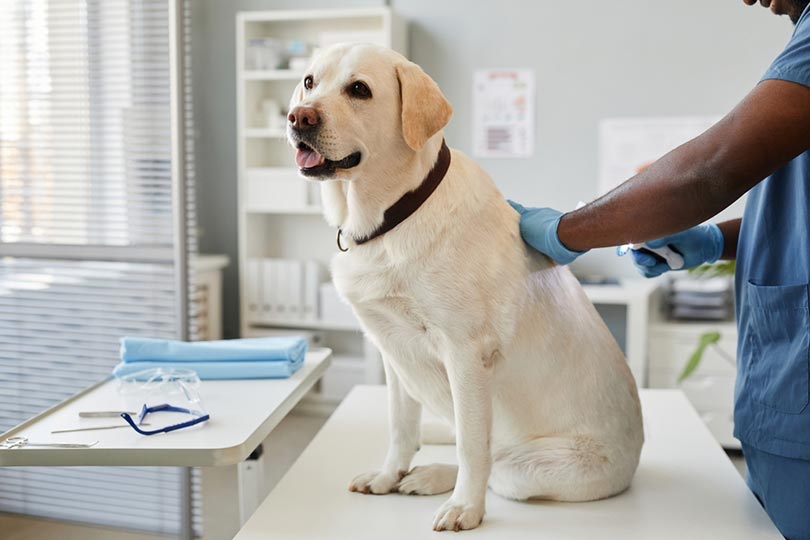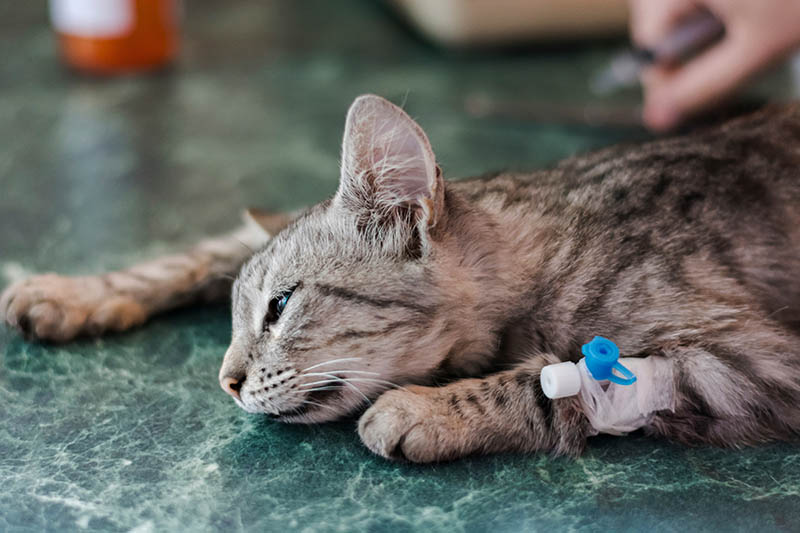Bronchitis in Dogs: Signs, Causes & Care (Vet Answer)
By Dr. Sharon Butzke, DVM (Vet)
Updated on

Uh oh…was that a cough you just heard? Or maybe you’ve been hearing it for a few days now. It’s hard not to worry when your pup is coughing, especially when you don’t know why. The first thing to do is schedule an appointment with your veterinarian, who can help you figure out what is going on.
There are many different conditions that can cause dogs to cough but, in this article, we will focus on bronchitis. Keep reading to learn about what that is, what causes it, and how it is diagnosed and treated.
What is Bronchitis?
Let’s start with a basic explanation of canine airway anatomy:
- When your pup breathes in, air enters their nose or mouth, then throat, followed by their trachea (windpipe)
- Inside your pup’s chest, the trachea splits into two main stem bronchi: one heading to each lung
- Inside the lungs, the mainstem bronchi split into smaller bronchi, then bronchioles, which continue splitting and become progressively smaller
- The smallest bronchioles eventually end in alveoli: little sacs where oxygen and carbon dioxide are exchanged with your pup’s blood
The term bronchitis refers to inflammation of the bronchi. If the trachea is also affected, the term tracheobronchitis is used.
Bronchitis in dogs is typically divided into two categories: acute (sudden onset) and chronic (long-term).

Acute bronchitis
The acute form of bronchitis in dogs is usually infectious tracheobronchitis (you are probably more familiar with the term “kennel cough”). It occurs commonly in younger pups, although dogs of any age can be affected. It is most often caused by an infectious agent (e.g., bacteria, virus, or both) and is highly contagious to other dogs.
Chronic bronchitis
Chronic bronchitis is typically defined as airway inflammation that results in daily (or almost daily) coughing, for longer than two months. It tends to occur in middle-aged and older small-breed dogs like Toy Poodles and Pomeranians, although large-breed dogs can also be affected. It is generally not caused by an infectious agent and is not contagious.
What Are the Signs of Bronchitis in Dogs?
The most common sign of bronchitis (regardless of whether it is acute or chronic) is coughing.
Acute infectious tracheobronchitis (kennel cough)
- The typical cough caused by kennel cough is often described as sounding like a goose honking
- Affected dogs have fits of coughing and may also retch, gag, and bring up white foamy liquid
- Mildly affected dogs usually still have a good appetite and energy level; dogs who are more significantly affected tend to have a decreased appetite and low energy
Chronic bronchitis
- Chronic bronchitis commonly produces a harsh, dry, hacking cough
- The cough is often worse at night, when first getting up in the morning, and during exercise/excitement
- Affected dogs can have noisy breathing and reduced ability to exercise
Unfortunately, it may not be possible to distinguish bronchitis from other causes of cough using clinical signs alone.

How Is Bronchitis Diagnosed in Dogs?
Acute infectious tracheobronchitis (kennel cough)
In cases of acute tracheobronchitis, a presumed diagnosis can often be made based on a patient’s history (especially if they had recent contact with another dog who was coughing).
Radiographs (x-rays) of the chest may be taken if there is any concern for pneumonia.
Chronic bronchitis
With chronic bronchitis, the diagnosis is typically a result of ruling out other possible causes of longstanding cough (e.g., heart or lung disease, tracheal collapse, etc).
Radiographs (x-rays) of the chest are often performed. Additional testing may include collecting cells from the airway for cytology (inspection under a microscope) and scoping the airways (bronchoscopy).

What Causes Bronchitis in Dogs?
Acute and chronic bronchitis have different causes.
Acute infectious tracheobronchitis (kennel cough)
As previously mentioned, acute infectious tracheobronchitis (kennel cough) is most often caused by an infection.
- Bordetella bronchiseptica bacteria
- Canine parainfluenza virus
- Canine adenovirus type-2
- Canine influenza
Chronic bronchitis
We are often unable to identify something specific that led to chronic bronchitis, but we know affected dogs’ immune responses contribute to changes in their airways and cause excess production of mucus. This inflammatory response unfortunately actually leads to more coughing and inflammation.

How Do I Care for a Dog With Bronchitis?
The approach to treatment is different for acute and chronic bronchitis.
Acute infectious tracheobronchitis (kennel cough)
Many healthy adult dogs only develop mild disease and are able to clear the infection on their own (especially if they have been vaccinated against kennel cough or have some natural immunity from prior infection). In some cases, veterinarians may prescribe a short course of anti-inflammatory or cough-suppressant medication because coughing creates inflammation, which can lead to more coughing.
Dogs who are more severely affected, as well as young puppies, elderly dogs, and those with compromised immune systems, may require antibiotics (especially if there is concern for pneumonia).
Chronic bronchitis
Chronic bronchitis is not infectious, so antibiotics are not generally needed. A variety of medications are used to manage chronic bronchitis (often in combination with each other), including:
- Corticosteroids (for their potent anti-inflammatory effect)
- Bronchodilators (to open up the airways)
- Cough suppressant medications (to minimize further inflammation caused by coughing)
Corticosteroids and bronchodilators may be given by mouth or via dog-specific inhalers. Cough suppressants are usually given by mouth.
It is also important to note that, for overweight pups, losing even a small percentage of their body weight can result in significant improvement in their cough. Consult your veterinary team for help implementing a healthy and safe weight loss plan, if indicated.

Frequently Asked Questions
How Long Does Bronchitis Last in Dogs?
Acute infectious tracheobronchitis (kennel cough) typically lasts anywhere from a few days to a couple of weeks. It is important to keep your pup away from other dogs during this time to avoid spreading the infection, which is highly contagious!
Chronic bronchitis, unfortunately, cannot be expected to ever fully resolve. It is a lifelong condition and the goal of treatment is to minimize coughing rather than stop it completely.
Can Bronchitis Go Away on Its Own?
Healthy adult dogs may be able to clear mild cases of acute infectious tracheobronchitis (kennel cough) on their own, but young puppies, elderly dogs, and those with compromised immune systems are at risk for developing pneumonia and may require antibiotics.
Chronic bronchitis will not go away on its own. It requires lifelong medical management and, without treatment, affected dogs can be expected to get worse over time.
How Can I Protect My Dog Against Bronchitis?
The best way to protect your dog from infectious tracheobronchitis is to vaccinate them against the common causes of kennel cough, especially if they go to dog parks, daycare, a groomer, or just happen to meet a lot of other canine friends in their daily life.
Vaccination is strongly recommended for young puppies because their immune systems are immature, but spending time with other dogs is an important part of their socialization!
Unfortunately, vaccination cannot guarantee that your pup will never get kennel cough, but vaccinated dogs usually have much milder symptoms than unvaccinated dogs.
Conclusion
If you notice your dog coughing, it is a good idea to have them checked out by a veterinarian sooner than later. It may be a simple case of kennel cough that will resolve on its own, but it is hard to rule out something more serious without a physical examination and possibly chest x-rays (if your vet feels they are needed).
To help protect your pup against acute infectious tracheobronchitis (kennel cough), keep them up-to-date on all of the vaccinations your vet recommends based on their lifestyle.
When it comes to chronic bronchitis, remember that coughing leads to inflammation, which leads to more coughing. Early intervention may allow for greater success in managing your pup’s condition.
Featured Image Credit: Leka Sergeeva, Shutterstock

















